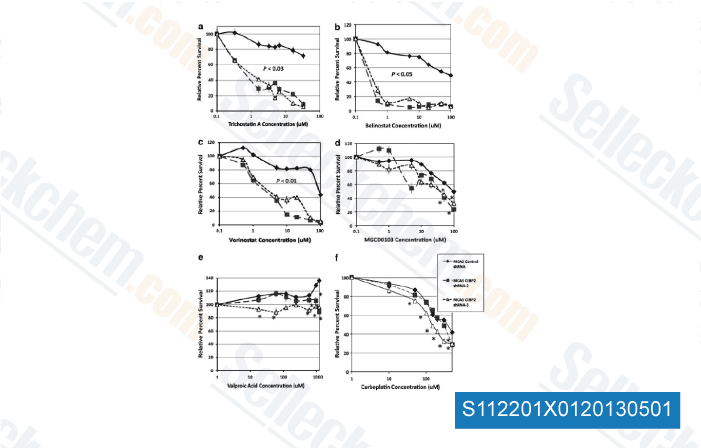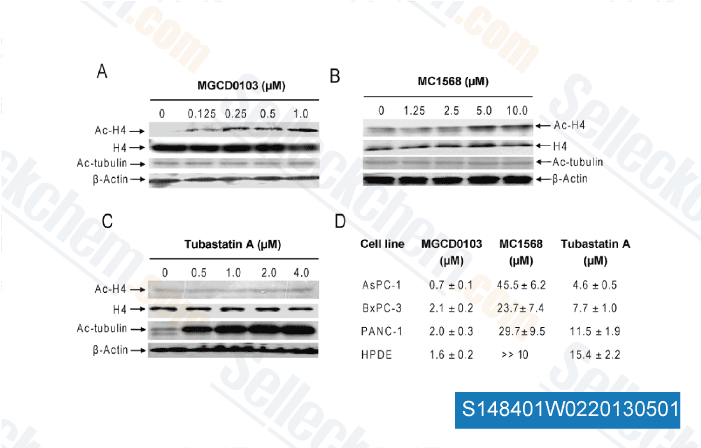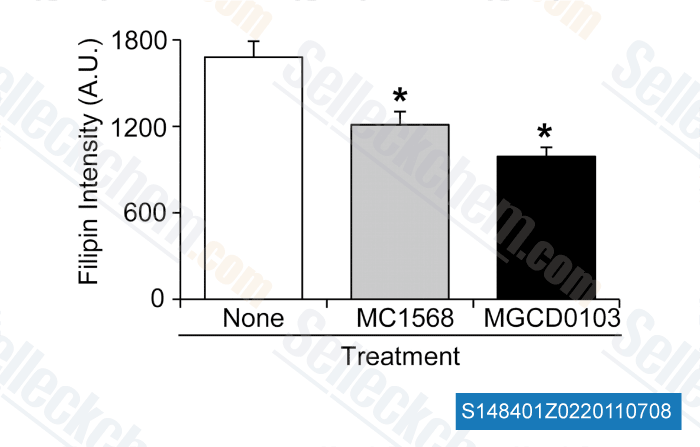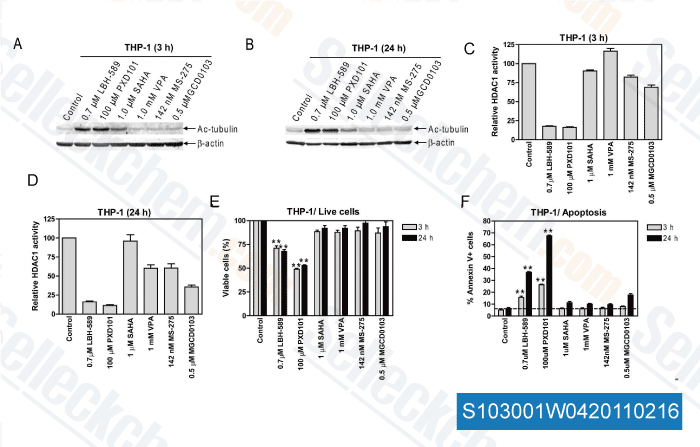|
Toll Free: (877) 796-6397 -- USA and Canada only -- |
Fax: +1-832-582-8590 Orders: +1-832-582-8158 |
Tech Support: +1-832-582-8158 Ext:3 Please provide your Order Number in the email. |
Technical Data
| Formula | C23H20N6O |
|||
| Molecular Weight | 396.44 | CAS No. | 726169-73-9 | |
| Solubility (25°C)* | In vitro | DMSO | 79 mg/mL (199.27 mM) | |
| Water | Insoluble | |||
| Ethanol | Insoluble | |||
|
* <1 mg/ml means slightly soluble or insoluble. * Please note that Selleck tests the solubility of all compounds in-house, and the actual solubility may differ slightly from published values. This is normal and is due to slight batch-to-batch variations. * Room temperature shipping (Stability testing shows this product can be shipped without any cooling measures.) |
||||
Preparing Stock Solutions
Biological Activity
| Description | Mocetinostat (MGCD0103, MG0103) is a potent HDAC inhibitor with most potency for HDAC1 with IC50 of 0.15 μM in a cell-free assay, 2- to 10- fold selectivity against HDAC2, 3, and 11, and no activity to HDAC4, 5, 6, 7, and 8. Mocetinostat (MGCD0103) induces apoptosis and autophagy. Phase 2. | ||||||||
|---|---|---|---|---|---|---|---|---|---|
| Targets |
|
||||||||
| In vitro | MGCD0103 inhibits only a subset of the nine human recombinant HDACs, including HDAC1, HDAC2, HDAC3, and HDAC11 at nanomolar or low micromolar concentrations, in a dose-dependent manner. MGCD0103 reveals most potent inhibitory activity against human HDAC1 and HDAC2 enzymes in vitro, and it does not inhibit class II HDACs. The exocyclic amino group in MGCD0103 is necessary for enzyme inhibitory activity because HDAC-inhibitory activity against HDAC1 and HDAC2 is completely abolished with the desamino analogue. The inhibitory activity of MGCD0103 reaches the maximum plateau at 6 μM, and the maximal inhibitable enzyme pool affected by MGCD0103 is 75% of the total enzyme activity in HCT116 cells whereas NVP-LAQ824 inhibits almost 100% of that in these cells. In A549 cells, MGCD0103 also exhibits dose-dependent inhibition of HDAC activity in whole cells. [1] |
||||||||
| In vivo | MGCD0103 significantly inhibites growth of human tumor xenografts in nude mice and the antitumor activity correlated with induction of histone acetylation in tumors. P.O. administration of MGCD0103 (2HBr salt) significantly decreases growth of implanted advanced A549 tumors in nude mice in a dose-dependent manner after 13 days of daily administration. MGCD0103 (170 mg/kg for 2HBr salt, corresponding to 120 mg/kg of free base) significantly blockes growth of tumors compared with vehicle treatment alone with no change in body weight. In addition, MGCD0103 does not reduce WBC counts and is well tolerated. MGCD0103 is also orally active in many other human tumor xenograft models including NSCLC H1437. MGCD0103 at 80 mg/kg (free base) almost completely blocks the growth of H1437 tumors after 13 days of daily p.o. administration with no reduction of body weight in animals. [1] MGCD0103 reduces pulmonary arterial pressure more dramatically. Moreover, MGCD0103 improves pulmonary artery acceleration time and reduced systolic notching of the pulmonary artery flow envelope, which suggests a positive impact of the HDAC inhibitor on pulmonary vascular remodeling and stiffening. [2] |
Protocol (from reference)
| Kinase Assay: |
|
|---|---|
| Cell Assay: |
|
| Animal Study: |
|
References
|
Customer Product Validation

-
Data from [Oncogene, 2012, 32, 3896-903]

-
Data from [PLoS One, 2012, 7, e52095]

-
Data from [J Biol Chem, 2011, 286, 23842–23851]

-
Data from [PLoS One, 2011, 6, e17138]
Selleck's Mocetinostat (MGCD0103) has been cited by 123 publications
| Inhibition of HDAC6 elicits anticancer effects on head and neck cancer cells through Sp1/SOD3/MKP1 signaling axis to downregulate ERK phosphorylation [ Cell Signal, 2025, 127:111587] | PubMed: 39755348 |
| HIV-1 Vpr drives epigenetic remodeling to enhance virus transcription and latency reactivation [ bioRxiv, 2025, 2025.01.31.635859] | PubMed: 39975144 |
| Role of the NuRD complex and altered proteostasis in cancer cell quiescence [ bioRxiv, 2025, 2025.02.10.637435] | PubMed: 39990343 |
| Inhibition of HDAC activity directly reprograms murine embryonic stem cells to trophoblast stem cells [ Dev Cell, 2024, S1534-5807(24)00326-5] | PubMed: 38823394 |
| Inhibition of Selenoprotein I promotes ferroptosis and reverses resistance to platinum chemotherapy by impairing Akt phosphorylation in ovarian cancer [ MedComm (2020), 2024, 5(12):e70033] | PubMed: 39669976 |
| Romidepsin and afatinib abrogate JAK-STAT signaling and elicit synergistic antitumor effects in cutaneous T-cell lymphoma [ J Invest Dermatol, 2024, S0022-202X(23)03210-4] | PubMed: 38219917 |
| Pancreatic cancer acquires resistance to MAPK pathway inhibition by clonal expansion and adaptive DNA hypermethylation [ Clin Epigenetics, 2024, 16(1):13] | PubMed: 38229153 |
| The impact of selective HDAC inhibitors on the transcriptome of early mouse embryos [ BMC Genomics, 2024, 25(1):143] | PubMed: 38317092 |
| Mocetinostat as a novel selective histone deacetylase (HDAC) inhibitor in the promotion of apoptosis in glioblastoma cell line C6 and T98G [ Res Sq, 2024, rs.3.rs-4170668] | PubMed: 38645087 |
| Epigenetic and molecular coordination between HDAC2 and SMAD3-SKI regulates essential brain tumour stem cell characteristics [ Nat Commun, 2023, 14(1):5051] | PubMed: 37598220 |
RETURN POLICY
Selleck Chemical’s Unconditional Return Policy ensures a smooth online shopping experience for our customers. If you are in any way unsatisfied with your purchase, you may return any item(s) within 7 days of receiving it. In the event of product quality issues, either protocol related or product related problems, you may return any item(s) within 365 days from the original purchase date. Please follow the instructions below when returning products.
SHIPPING AND STORAGE
Selleck products are transported at room temperature. If you receive the product at room temperature, please rest assured, the Selleck Quality Inspection Department has conducted experiments to verify that the normal temperature placement of one month will not affect the biological activity of powder products. After collecting, please store the product according to the requirements described in the datasheet. Most Selleck products are stable under the recommended conditions.
NOT FOR HUMAN, VETERINARY DIAGNOSTIC OR THERAPEUTIC USE.
